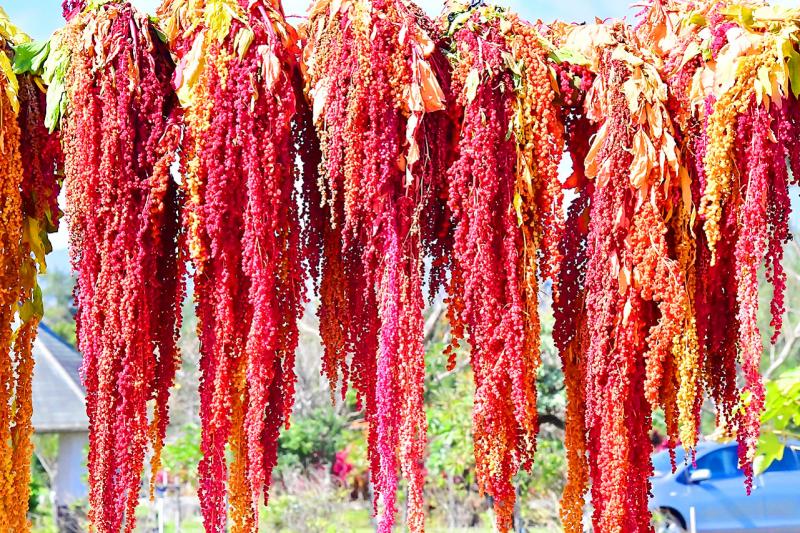Taiwan is to send plant seeds to outer space for the first time in October to observe how the space environment affects their genetic makeup, the National Space Organization (NSPO) said yesterday.
The Space Seeds for Asian Future program is being developed by the Japan Aerospace Exploration Agency. Nine nations, including Taiwan, are participating in the program this year, with 16 kinds of seeds expected to be sent to the International Space Station (ISS), where they would stay for about four months, the NSPO said.
Participating nations have primarily chosen the seeds of endemic plants or plants with symbolic meaning, it said, adding that some are crop seeds.

Photo: Chen Hsien-i, Taipei Times
The NSPO collaborated with National Chung Hsing University’s College of Agriculture and Natural Resources and the Taiwan Agricultural Research Institute, which is overseen by the Council of Agriculture, to choose which seeds to send, it said.
The college has chosen the seeds of Formosa lambsquarters, Phalaenopsis equestris, which is a kind of “butterfly orchid” originating from Lesser Orchid Island (小蘭嶼), and sunflowers, while the institute has picked chili pepper seeds, the NSPO said.
The seeds to be sent to the ISS weigh 10g, 1g, 20g and 16g respectively, it added.
The seeds selected by the university have arrived in Japan and are expected to be sent to the US next month, the NSPO said, adding that they would be returned to Taiwan in February next year.
The university is to plant the seeds following their return and observe how factors such as microgravity and space radiation affect their growth, it said.
Experts chose which seeds to send following multiple meetings with academics specializing in plants after assessing factors such as contribution to teaching and research, and weight limits for space travel, college dean Chan Fu-chih (詹富智) said.
As Japan and the US have different regulations regarding the importation of seeds, lengthy preparations had to be made, such as filling out forms on the quarantine of imported and exported seeds, as well as advance virus tests on them, Chan said.
Formosa lambsquarters, also endemic to Taiwan, is a traditional crop grown by Aborigines, but little research has been dedicated to it, while sunflower is a common plant, making it a convenient target for observation and research, she said.
Thailand and Australia have picked the seeds of their national flowers, the ratchaphruek and the golden wattle respectively; New Zealand is sending the seeds of the pohutukawa, an endemic plant; Indonesia is sending celery and onion seeds; and Malaysia the seed of holy basil, the NSPO said.

A Ministry of Foreign Affairs official yesterday said that a delegation that visited China for an APEC meeting did not receive any kind of treatment that downgraded Taiwan’s sovereignty. Department of International Organizations Director-General Jonathan Sun (孫儉元) said that he and a group of ministry officials visited Shenzhen, China, to attend the APEC Informal Senior Officials’ Meeting last month. The trip went “smoothly and safely” for all Taiwanese delegates, as the Chinese side arranged the trip in accordance with long-standing practices, Sun said at the ministry’s weekly briefing. The Taiwanese group did not encounter any political suppression, he said. Sun made the remarks when

The Taiwanese passport ranked 33rd in a global listing of passports by convenience this month, rising three places from last month’s ranking, but matching its position in January last year. The Henley Passport Index, an international ranking of passports by the number of designations its holder can travel to without a visa, showed that the Taiwan passport enables holders to travel to 139 countries and territories without a visa. Singapore’s passport was ranked the most powerful with visa-free access to 192 destinations out of 227, according to the index published on Tuesday by UK-based migration investment consultancy firm Henley and Partners. Japan’s and

BROAD AGREEMENT: The two are nearing a trade deal to reduce Taiwan’s tariff to 15% and a commitment for TSMC to build five more fabs, a ‘New York Times’ report said Taiwan and the US have reached a broad consensus on a trade deal, the Executive Yuan’s Office of Trade Negotiations said yesterday, after a report said that Washington is set to reduce Taiwan’s tariff rate to 15 percent. The New York Times on Monday reported that the two nations are nearing a trade deal to reduce Taiwan’s tariff rate to 15 percent and commit Taiwan Semiconductor Manufacturing Co (TSMC, 台積電) to building at least five more facilities in the US. “The agreement, which has been under negotiation for months, is being legally scrubbed and could be announced this month,” the paper said,

Japan and the Philippines yesterday signed a defense pact that would allow the tax-free provision of ammunition, fuel, food and other necessities when their forces stage joint training to boost deterrence against China’s growing aggression in the region and to bolster their preparation for natural disasters. Japan has faced increasing political, trade and security tensions with China, which was angered by Japanese Prime Minister Sanae Takaichi’s remark that a Chinese attack on Taiwan would be a survival-threatening situation for Japan, triggering a military response. Japan and the Philippines have also had separate territorial conflicts with Beijing in the East and South China